Twelve of the best films of 2021 so far
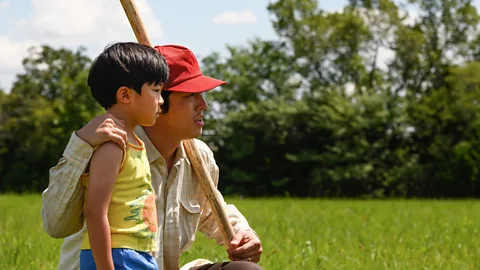 Melissa Lukenbaugh, Courtesy of A24
Melissa Lukenbaugh, Courtesy of A24BBC Culture film critics Nicholas Barber and Caryn James pick their highlights of the year so far, including Minari, Nomadland and The Father.
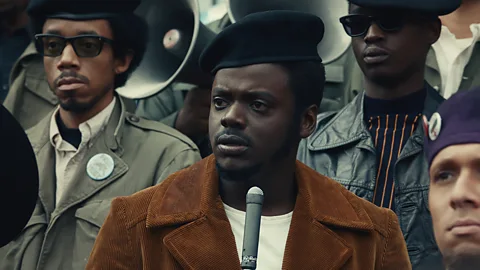 Warner Bros Pictures
Warner Bros PicturesJudas and the Black Messiah
The true story of Fred Hampton, the Black Panther Party leader who was murdered in 1969 on orders from the FBI, becomes high drama in director Shaka King's film, which is by turns suspenseful, action-filled and intimate. Daniel Kaluuya's Oscar-nominated performance as Hampton is so charismatic – he was a ionate revolutionary and a dynamo of a public speaker – that it demonstrates why the FBI feared Hampton would become a Messiah. LaKeith Stanfield brings wiliness and desperation to the Judas figure, who infiltrates the Panthers for the government and betrays Hampton. Beyond these electrifying personal stories, the film's themes of black power and police abuse resonate profoundly with social justice movements today. (CJ)
 Melissa Lukenbaugh, Courtesy of A24
Melissa Lukenbaugh, Courtesy of A24Minari
Lee Isaac Chung's understated yet sparkling autobiographical drama introduces a Korean-American family that moves to a 50-acre farm in Arkansas in the 1980s. Every detail is so vivid and specific that it all rings true, from the fears of the children (Alan Kim and Noel Kate Cho) to the tensions between their exhausted parents (Steven Yeun and Yeri Han) to the quirks of their peacemaking grandmother (Yuh-jung Youn). Minari is also a groundbreaking film. Most of the dialogue in Korean, so it stands out from every previous American depiction of immigrant life. While you are watching it, though, you soon forget how radical it is, because you are immersed in the difficulties and rewards of making a life somewhere new. (NB)
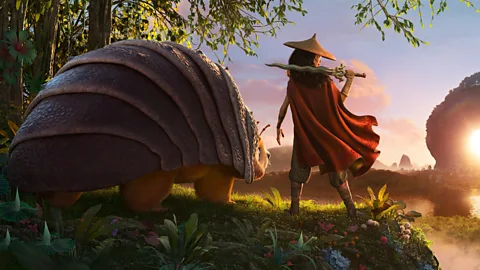 Disney
DisneyRaya and the Last Dragon
Funny, colourful and action-filled, this Disney family film set in the fictional ancient Asian kingdom of Kumandra is a delight. Raya is a young warrior heroine (voiced with the perfect mix of spirit and doubt by Kelly Marie Tran) who must find the last surviving magical dragon so she can defeat the powers of evil and save her father. That dragon turns out to be the traditional, energetic, smart-mouthed comic sidekick, played by the ideally cast Awkwafina. With Daniel Dae Kim as Raya's father and Gemma Chan as her fearsome rival, the film is a visual swirl of shape-shifting and fast-paced adventure, featuring a non-sugary lesson about learning to trust. (CJ)
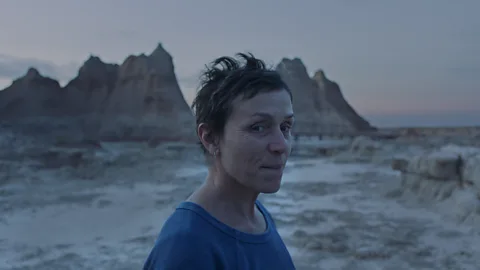 Searchlight Pictures
Searchlight PicturesNomadland
Chloé Zhao follows The Rider – one of 2017's best films – with another humane and hypnotic survey of the kind of marginal American life that Hollywood usually ignores. Adapted from the book by Jessica Bruder, Nomadland stars s McDormand as Fern, a retired widow with no children. Like a surprising number of her fellow pensioners, she can’t afford to stay in her house, so she packs her few belongings into an old RV and drives around the desert (stunningly shot by Joshua James Richards). McDormand is one of the only professional actors in the cast – in most scenes she interacts with real nomads who recount their own experiences. But she and Zhao blur the boundaries between fact and fiction so skillfully that Fern never seems out of place. Nomadland is a wonderful achievement. Apart from The Rider, there aren't any films quite like it. (NB)
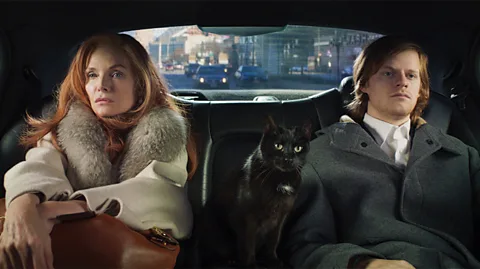 Sony Pictures Classics
Sony Pictures ClassicsFrench Exit
Michelle's Pfeiffer brings glamour, hauteur, biting wit and an undertone of sympathy and sadness to the role of s, a wealthy woman gone broke, who flees to Paris with her grown but immature son (Lucas Hedges). Pfeiffer's dazzling turn is the centrepiece of a film that easily handles its tricky tone, a sophisticated balance of dark wit, farce and genuine emotion. An unlikely crew of vibrant characters includes a nonchalant clairvoyant (Danielle Macdonald) who can speak to s' cat and a relentlessly upbeat American emigre (Valerie Mahaffey). Alluring and touching, the film is a confection with a breaking heart. (CJ)
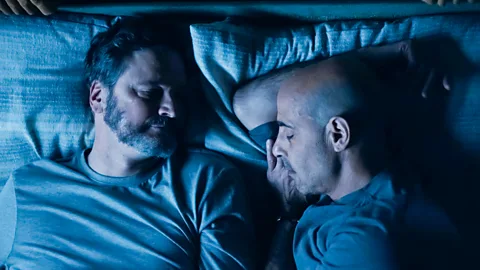 Alamy
AlamySupernova
This tender tribute to love and friendship stars Colin Firth as an English concert pianist and Stanley Tucci as his partner, an American author with early-onset dementia. As the men drive through the scenic Lake District in their trusty camper van, they have to face up to the likelihood that this will be their final holiday together – and work out what to do next. It's a heart-wrenching scenario, but for now the couple is a pleasure to be around: gentle, funny, open, and glowing with uncomplicated affection. The film is, too. Without ever veering into sentimentality, Harry Macqueen's highly polished script and sensitive direction convey just how precious the men’s connection is, and how devastating it will be for them to lose it. (NB)
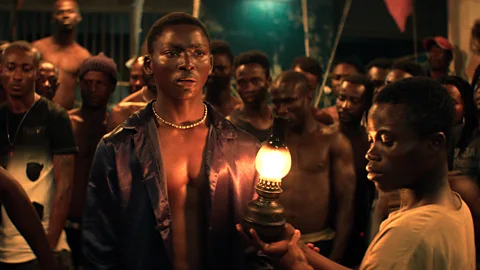 Neon
NeonNight of the Kings
Harsh realism meets legend in Philippe Lacôte's audacious, genre-bending drama. It is set in a run-down prison in the Ivory Coast, but its soul belongs to the storytelling traditions of African griots and Scheherazade. The inmates, roaming free in a courtyard, enact a ritual in which a chosen prisoner must tell a story all night or be killed. The young victim recounts his first-hand knowledge, or so he says, of a notorious criminal. As we see flashbacks to that tale, fact veers into myth, and a queen with supernatural powers goes into battle. At times prisoners chant and move in stylised, choreographed motions to mirror the narrative, in an artful film that immerses us in the life-saving power of stories. (CJ)
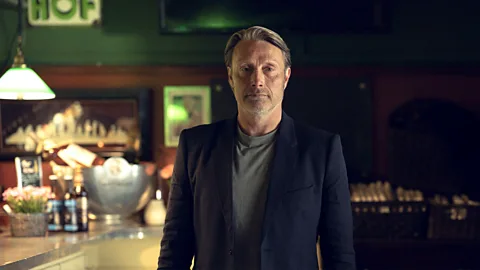 Alamy
AlamyAnother Round
Thomas Vinterberg mixes an intoxicating cocktail of comedy and drama in Another Round (or Druk, to use its original Danish title), pouring out an outrageous premise and then combining it with sympathy and respect for the characters. The premise is that a history teacher (Mads Mikkelsen) and three of his closest colleagues decide to cope with middle age by drinking all day and hoping that no one else notices. Their experiment serves as both an uproarious celebration of alcohol and a piquant warning against becoming dependent on it. And Mikkelsen has never been better. His performance is a masterclass in subtlety and reserve, at least until he shows off his wildest jazz-ballet moves in the glorious final sequence. (NB)
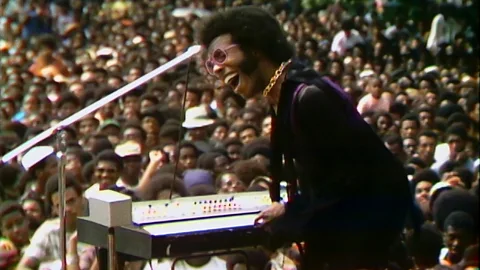 Courtesy of Mass Distraction Media
Courtesy of Mass Distraction MediaSummer of Soul (...or, When the Revolution Could Not Be Televised)
This joyous documentary about a long-forgotten 1969 music festival, sometimes called the Black Woodstock, is an intellectually astute, vibrant piece of history. In his first film as director, Ahmir (Questlove) Thompson expertly curates the festival's exhilarating performances from Stevie Wonder, Nina Simone, Mahalia Jackson, The 5th Dimension and many others, putting them in the context of the festival's tense political moment, in the shadow of Dr Martin Luther King Jr's assassination just one year before. Expertly balancing entertainment and political purpose, the film isn't a nostalgic journey into the past: it reclaims a lost piece of history, repositioning it for our own era of racial awareness. (CJ)
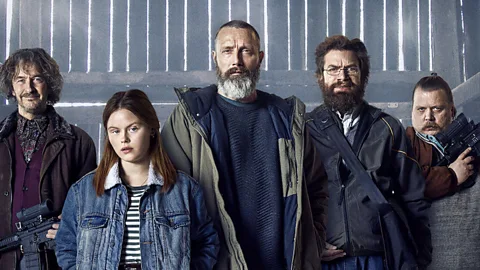 Nordisk Film
Nordisk FilmRiders of Justice
Yes, not one but two of the films on this list are Danish midlife-crisis comedy dramas starring Mads Mikkelsen. Another Round was the one that won the Oscar for best international feature film, but Anders Thomas Jensen's Riders of Justice is just as entertaining. Transformed by a crewcut and a bushy beard, Mikkelsen plays Markus, a gruff soldier whose wife is killed in a train crash. When he returns to his home in Denmark from a posting overseas, a nerdy statistician (Nikolaj Lie Kaas) tells him that the crash was no accident: the train was sabotaged because one of the engers was due to testify against a biker gang. What follows is a blackly funny vigilante thriller, rich in characters, packed with twists, and splattered with violence. But it's also a touching study of the ways in which we cope with trauma and bereavement. Oh – and it's a lovely Christmas movie, too. (NB)
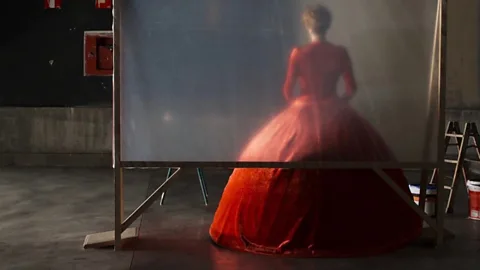 Sony Pictures Classics
Sony Pictures ClassicsThe Human Voice
Running only 30 minutes, this emotionally potent, visually dazzling little film comes from two masters. Directed by Pedro Almodóvar and starring Tilda Swinton, the drama is loosely based on Jean Cocteau's 1930 play, in which a woman talks on the phone to a man who has abandoned her. Almodóvar adds a meta twist as Swinton wanders from a deserted stage set into an apartment, suggesting she is playing a film role. Yet her tumultuous feelings are visceral. In voiceover and on her mobile phone, she speaks to the lover who has left her, cascading from defiant pride to pleading to resilience. In Balenciaga clothes, including a glamourous vermilion gown, Swinton wanders around one of the most colourful sets in all of Almodóvardom, giving her character's monologue intimacy and urgency, until her old life goes up in flames. (CJ)
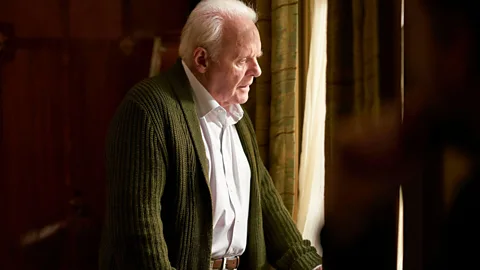 Alamy
AlamyThe Father
Anthony (an Oscar-winning Anthony Hopkins) is a sprightly 80-something who is enjoying retirement in his beloved London flat. His daughter (Olivia Colman) is caring and attentive, but the people and the furniture around him keep changing, giving The Father the feel of a horror movie – and in a way it is. The conceit is that Anthony has dementia, and most of the film is shown from his perspective. It's chilling, upsetting, but utterly gripping, because you never know what will happen next and how it will connect to what's gone before. Not that The Father is a mere exercise in technical ingenuity. Florian Zeller's grief-racked drama, which he adapted from his own play with the help of Christopher Hampton, makes you dread having an infirm parent, and makes you dread becoming one even more. (NB)
Love film and TV? BBC Culture Film and TV Club on Facebook, a community for cinephiles all over the world.
If you would like to comment on this story or anything else you have seen on BBC Culture, head over to our Facebook page or message us on Twitter.
And if you liked this story, sign up for the weekly bbc.com features newsletter, called The Essential List. A handpicked selection of stories from BBC Future, Culture, Worklife and Travel, delivered to your inbox every Friday.
